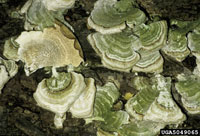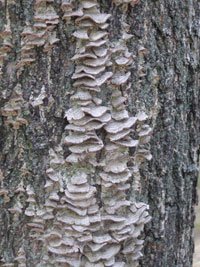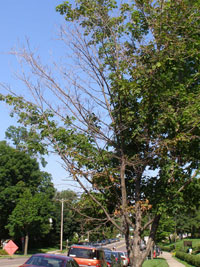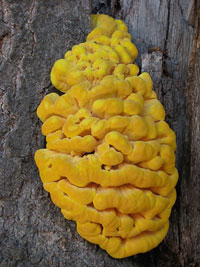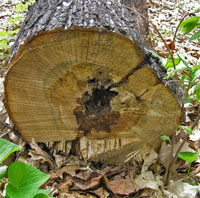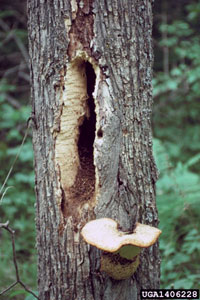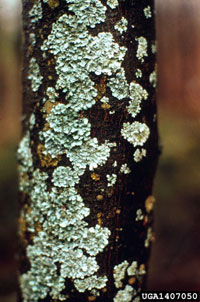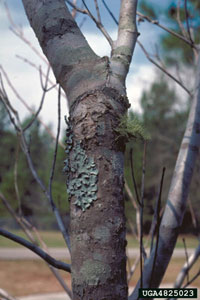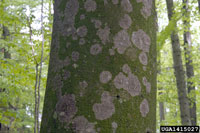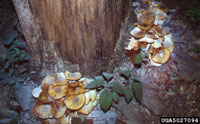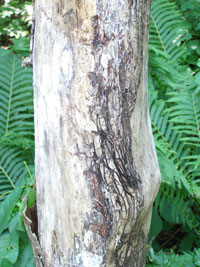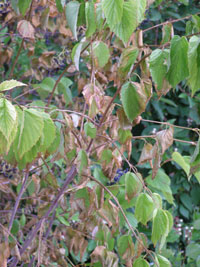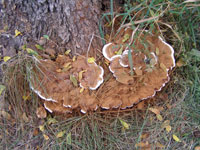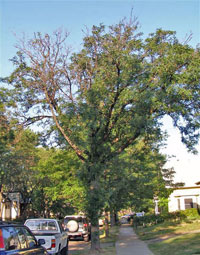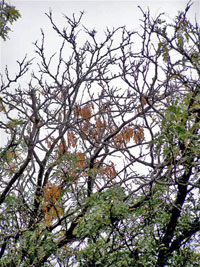Extension > Garden > Diagnose a problem > What's wrong with my plant? > Deciduous Trees > Hackberry > Fungi growing on trunk or branches
Hackberry > Branches/Trunk > Fungi growing on trunk/branches
1 of 5
Sapwood rot
Cerrena unicolor
- Groups or rows of small (< 2 inches wide) semi-circle self fungi along killed branches or on the main trunk
- Shelf fungi are white to greenish grey and have concentric rings on the surface
- Dead branches within the canopy
- Common on trees with an open wound or crack
- Wood below fungal shelves is yellowish to white, crumbly and decayed; bark around fungal shelves is killed and often falls off
- More information on Sapwood rot
2 of 5
Heart rot
Polyporus squamosus, Laetiporus sulfereus and others
- Fungal fruiting bodies arise along the stem, near a pruning wound, crack or other wound
- Many shapes and sizes of fungal fruiting bodies may be seen
- In cross section of the trunk, the wood at the center is discolored, soft, crumbling, stringy or spongy
- The canopy may show no symptoms or may have small yellowing leaves/dead branches depending on the extent of the trunk decay
- More information on heart rot
3 of 5
Lichens
Several species
- Colorful patches on the bark of trunk and/or branches
- Can be wrinkled, in scalloped sheets, lace-like pads, bushy tufts, paint-like spots or splashes
- Forms can be flat against the bark surface or raised in leaf-like lobes, finger-like or hairy projections
- Colors may be shades of gray, green, blue, yellow, orange, or red
- Lichens do not harm trees or shrubs and no management is necessary
- More information on Lichens
4 of 5
Armillaria root rot
Armillaria spp.
- Clusters of honey-colored mushrooms may grow at the base of the tree in fall
- Infected trees have poor growth, dead branches in the upper canopy, undersized and/or yellow leaves
- Wood is decayed, white, soft and spongy, and this may extend from the base of the tree well up into the trunk
- Trees frequently break or fall over in storms
- Flat white sheets of fungal mycelia (mycelia fans) grow between the bark and sapwood at the base of infected trees
- Thick black, shoestring-like fungus can sometimes be seen under the bark, around roots and in the soil around the base of the tree
- More information on Armillaria root rot
5 of 5
Ganoderma root and butt rot
Ganoderma spp.
- Fungal conks, a semicircle shelf fungi, can be found from the base of the tree up to 3 feet high on the trunk
- Conks are reddish brown and shiny on top, white and porous underneath; a rim of white may be visible on the edge of
growing conks - Infected wood at the tree base is white, soft, stringy or spongy
- Infected trees frequently break or fall over in storms
- Canopy appears thin with few leaves and multiple dead branches
- Leaves are smaller in size and turn yellow earlier than normal
- More information on Ganoderma root and butt rot



